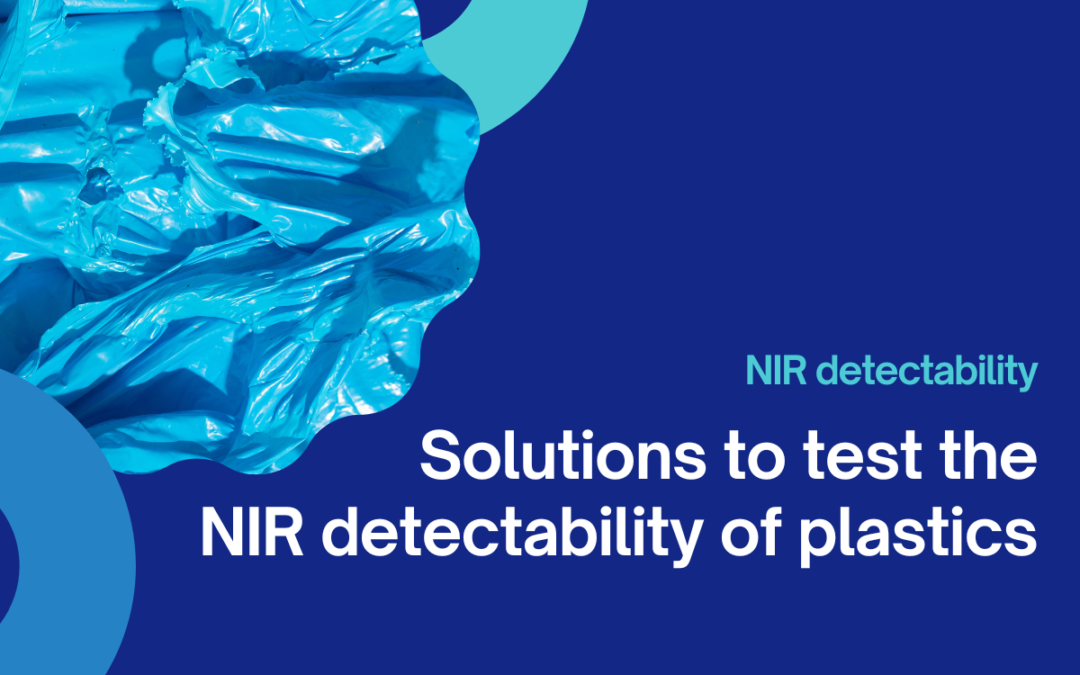2 tools for developing and evaluating NIR black colors and packaging solutions
Why use NIR technology for recycling?
Pros of NIR: easy to use, non-destructive, can detect a wide range of plastics
Near Infrared (NIR) spectroscopy (NIRS) is a non-destructive, cost-effective tool for measuring materials in the recycling industry. It allows recyclers to quickly and accurately identify different types of materials without altering them, making it an ideal tool for sorting recyclable materials. As a result, it has become increasingly popular due to its flexibility, affordability and lack of sample preparation requirements.
Cons of NIR: Inability to detect carbon black colored plastics
However, dark plastics have been a challenge to recycle due to their high carbon content, which absorbs radiation in both the visible and infrared spectrums. This becomes a major issue as large amounts of plastic are dark or black plastics.
How much carbon black plastic is on the market? In the UK alone, it is estimated that between 30,000 and 60,000 tonnes of black plastic is produced each year, which is essentially non-recyclable (except for thermal recycling). This is a huge environmental issue when it comes to the circular economy, especially when we’re talking about black plastic consumer packaging, which has a high litter rate.
Decreasing spectral reflectance intensity reduces recyclability, so maintaining this intensity is essential for successful recycling.
Solutions to improve NIR recyclability of plastic
Clear plastics improve recyclability
Clear plastic helps improve recyclability and reduce waste. Sprite has switched from green to clear plastic to make them easier to recycle, and Sainsbury‘s has switched all its sparkling water bottles from green to clear.
NIR Detectable master batch
By using our NIR detectable master batch, black and dark colored plastic items can be correctly sorted and recycled using NIR sensor technology. For example, Avient offers dark colours without carbon black for PET, HDPE and PP. NIR reflective additives make them detectable by the near infrared (NIR) sensors used in automated polymer sorting systems at recycling centers.
Who offers NIR detectable plastics, master batches and black packaging?
Tools for developing and certifying NIR black colors and packaging solutions
What is the NIR test?
If we want to test NIR detectability, we need an NIR spectrometer, simple as that. The widely used NIR sensor technology evaluates the near infrared spectrum reflected by (the black pigment in) the plastic.
We offer 2 different solutions for developing and evaluating NIR detectability
trinamiX – portable NIR solution provides NIR reflectivity
The trinamiX NIR Reflectance application outputs the NIR reflectance of a given material in percent. Below 10% reflectance the sample is not considered NIR detectable according to the APR standard (The Association of Plastic Recyclers – Design Guide: Near Infrared (NIR) Sorting in the Plastics Recycling Process).
trinamiX’s solution is easy to use, portable and gives you a clear and easy to understand result: Perfect when you need to evaluate the reflectance of multiple samples within seconds. Reports can be generated from the customer portal, including a snapshot of each spectrum and all metadata, and all measured spectra can be downloaded as CSV and XLS files for processing in any other software solution, such as SpectraGryph.
Solid Scanner – Minilab outputs similarity to perfect sample
Our own solution, the portable NIR minilab Solid Scanner, focuses on the similarity to a perfect sample in PP and PE. With this approach, we focus more on detection and less on basic physical values such as reflectance of infrared light.
Furthermore, our solution is customizable, i.e. the NIR detection data model can be adapted and completely new data models can be programmed for any NIR application. We offer a PCA based machine learning method as standard and provide engineering services as well as a software solution for chemometric modelling based on stochastic mathematical solutions.
About us – Solid Scanner
Let’s take responsibility! Our partner trinamiX also takes this credo to heart. Let’s take responsibility and recycle more plastics – ask us for suitable solutions. Our portfolio includes solutions ranging from small, portable solutions to individual solutions based on hyperspectral camera systems for simple, automated identification of plastic materials in the sorting process.
About trinamiX – the sensor company
trinamiX GmbH, based in Ludwigshafen, Germany, was founded in 2015 as a wholly owned subsidiary of BASF SE. As a startup within the company, it is not only operationally independent, but also has unique access to the expertise and experience of the entire BASF Group.
Its patent-pending technologies enable people and machines to grasp the hidden and invisible worlds around them to make better decisions and increase safety.
Contact us
Please contact us for further information, a concrete offer and questions about availability and delivery times of the NIR solution from trinamiX.
Related information
Portable plastic identification solution from trinamiX (product information)


